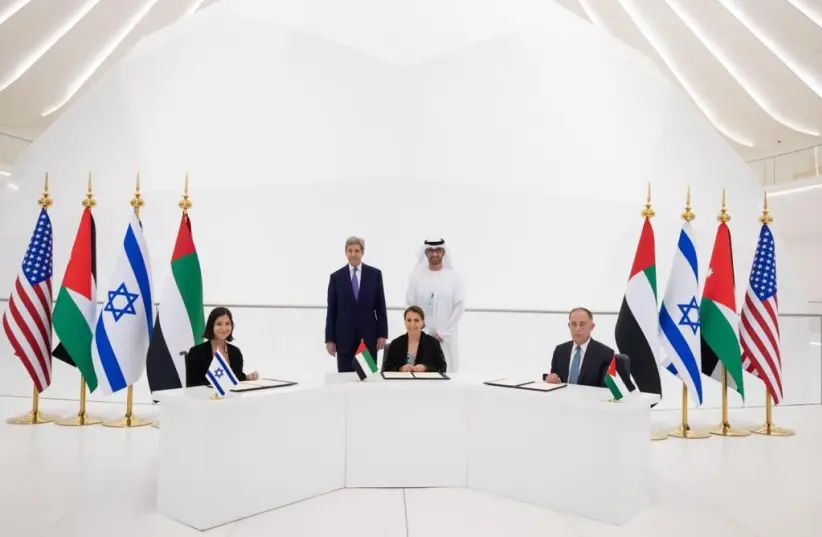
The water-for-energy deal made between Israel, Jordan and the UAE shows how collaboration can solve the planet’s greatest problems.
When Israel, Jordan and the United Arab Emirates announced a water-for-energy deal last month, they provided a blueprint for how unprecedented forms of collaboration can help solve the world’s greatest problems.
Jordan will provide 600 megawatts of solar generating capacity exported to Israel, with Israel providing water-scarce Jordan with 200 million cubic meters of desalinated water.
Before they signed a peace treaty in 1994, Israel and Jordan could not have made this deal. But this particular agreement would not have been possible before 2020 when the UAE normalized ties with Israel as part of the Abraham Accords.
Today, due to the blossoming Arab-Israeli relationships in the new Middle East, the UAE was capable of providing both the capital resources and the diplomatic willpower to transform a landmark trilateral vision into a reality.
“This is a message to the world on how countries can work together to fight the climate crisis,” Energy Minister Karin Elharrar said.
Without innovative collaboration, not only between countries but also between the private, government and academic sectors, humankind will not be able to tackle this generation’s defining challenges, such as climate change.
No single country among Israel, Jordan and the UAE could have acted alone to address its environmental issues. Yet even more significantly, no two states among those three could have adequately solved these particular water or energy problems through a simpler bilateral arrangement.
The initiation of such multilateral agreements in the aftermath of the Abraham Accords underscores how political differences are beginning to become obsolete. A problem such as climate change is too dramatic for political considerations to get in the way. Existential issues like climate change can only be addressed through the determination to work together in new ways, in the face of all perceived obstacles.
This model for game-changing collaboration must be replicated around the world. In fact, this approach has long been implemented in the halls of academia – in the ivory towers of New England, in Silicon Valley, in North Carolina’s Research Triangle and between them all – as well as between institutions from the US, Israel and countries across the globe.
For instance, a consortium of leading universities – Harvard, MIT, the University of California at Berkeley, Imperial College London, CUNY and the University of Haifa – are currently engaged in the Cetacean Translation Initiative (CETI), a multidisciplinary project to decipher the communication of sperm whales.
Much like humans, these marine mammals have a sophisticated communication system; they keep carbon out of the atmosphere, support our oxygen supply and are a crucial element in sustaining a viable marine ecosystem. This consortium seeks to decipher the structure of their communicative patterns, clearing the path toward meaningful dialogue with other species.
CETI exhibits another layer to the forms of collaboration that will address the world’s most significant challenges. To comprehensively understand the depths of the ocean and to subsequently extract impactful social solutions from that research, humans cannot be the only species involved in the process. In other words: Humans cannot save the planet by themselves, or only for themselves.
By removing the communication barrier between humans and marine species, CETI’s partners hope to come up with novel forms of marine conservation, thereby mitigating the impact of climate change on all forms of life, human and otherwise.
The universities aim to expand this program beyond sperm whales to all forms of marine mammals. Working off the accomplishments of CETI, the program will be interlinked through several centers located in major marine centers. It will establish an international scientific leadership group (the “brain hub”), which will lead the world in climate-change adaptation by virtue of the sea.
It will develop a global e-faculty dedicated to marine conservation, through cross-disciplinary interspecies interaction. Finally, to serve as a world-class hub for interdisciplinary research and innovation, CETI will foster international scientific and economic development in climate-change adaptation solutions.
SIMILAR PROGRESS in the realm of multifaceted collaboration is taking hold worldwide. In October, the foreign ministers of India, the US, Israel and the UAE convened to brainstorm about the concept of the “new quad,” entailing technology collaboration along with joint infrastructure projects in transportation, political and economic cooperation, and maritime security matters.
Meanwhile, private companies, research universities and governments were all essential partners in the historically rapid development of the vaccine against COVID-19. Moving forward, the world’s most pressing problems will continue to require faster solutions – and once again, the only feasible means to that end is collaboration.
But in this quest, what unique value does Israel actually bring to the table? After all, virtually every developed country has hi-tech centers or other hi-tech infrastructure.
The answer lies not necessarily in Israel’s booming Start-Up Nation scene but in the cultural roots of that landscape. Small nations often have distinctive competencies, natural resources and industries that they seek to employ and amplify.
In Israel’s case, this is centered on technology and entrepreneurship, evolving out of need as a new nation and from compulsory military service, which trains preuniversity youth to be flexible and responsive to challenges in short time frames.

When life presents numerous surprises, Israelis are undaunted by time pressures and well equipped to improvise for the greater good. And today, in the new Middle East, the Israeli government and people have been prepared to think outside the box by forming unprecedented partnerships with Arab states and engaging in new forms of collaboration – not only for the Jewish state’s own benefit but for the benefit of the region and the world.
When it comes to the climate-change crisis, in particular, Israel offers numerous advantages for initiating experimentation in hypotheses and solutions, as it is currently the epicenter of the global shift. Israel has 180 kilometers of largely unexplored Mediterranean coastline.
The Eastern Mediterranean Sea is known to be particularly sensitive to environmental and climate change because such changes have happened in the recent past. The present Eastern Mediterranean is a marine desert, but as recently as 5,000 years ago, it was the opposite. At that time, organic-rich sedimentary deposits known as sapropels were deposited in the Eastern Mediterranean (and almost nowhere else).
The water column supported much higher levels of primary productivity, and the deep waters below 500 meters were suboxic/anoxic. This profound change in the Eastern Mediterranean took place as a result of climate change. It seems that the climate became more humid, which caused changes in the physical circulation in the basin and slowed the water exchange at the Straits of Sicily.
Modern physical climate models are predicting that because of modern anthropogenic climate change, similar changes in circulation may occur. Therefore, the groundbreaking marine sciences research taking place in Israel provides indispensable insights into the climate-change crisis not only in the region but globally.
Israel also understands that with Syria, Yemen and other countries in the region imploding as a result of climate change, the Jewish state cannot afford to allow its eastern neighbor, Jordan, to similarly implode. Accordingly, agreements like the recent water-for-energy deal illustrate how Jerusalem solves these problems by embracing the new array of relationships in the region and novel forms of collaboration. The impact of such multilateral and cross-sector collaboration going beyond traditional relationships and boundaries to collectively harness expertise and resources extends far beyond the companies, governments and academic institutions involved in each partnership. Rather, this innovative approach represents an essential strategy that may very well save the planet.














